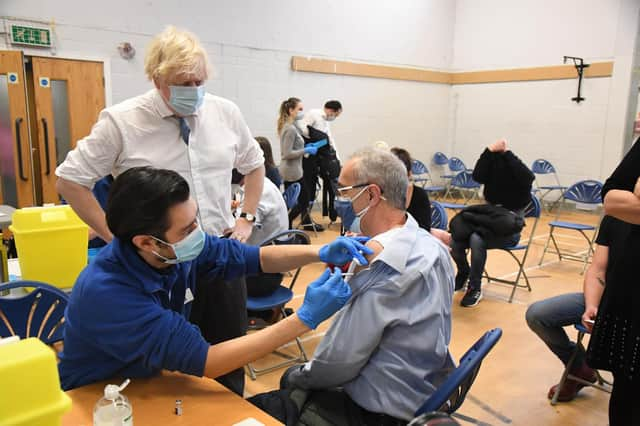First Omicron death in UK confirmed by Boris Johnson


Speaking during a visit to a vaccination clinic near Paddington, in west London on Monday morning, the Prime Minister said: “Sadly yes Omicron is producing hospitalisations and sadly at least one patient has been confirmed to have died with Omicron.
“So I think the idea that this is somehow a milder version of the virus, I think that’s something we need to set on one side and just recognise the sheer pace at which it accelerates through the population. So the best thing we can do is all get our boosters.”
Advertisement
Hide AdAdvertisement
Hide AdThe Government said at the weekend there were 10 patients in England in hospital with confirmed cases of Omicron.
Mr Johnson said that Omicron now represents about 40 per cent of coronavirus cases in London and “tomorrow it’ll be the majority of the cases” in the capital.
He told broadcasters: “The risk is plainly there, we can see Omicron spiking now in London and some other parts of the country.
“Here in the capital it probably represents about 40 per cent of the cases. By tomorrow it’ll be the majority of the cases and it’s increasing the whole time.”
Advertisement
Hide AdAdvertisement
Hide AdThe Prime Minister was asked whether the accelerated delivery of the booster programme announced on Sunday was too little too late.
He said: “We now want to hit warp speed and we’ll have to attain a pace and a number of daily booster doses that will exceed anything that we’ve done before.
“But I’ve got no doubt at all that we have the people, we have the enthusiasm, we have the fundamental optimism about what we can do, which we’ve learned from the experience of the last 18 months.
“And I know that people are going to rise to this.”
The Prime Minister said there was a “ready supply” of lateral flow tests, after the Government website on Monday said “there are no more home tests available”.
Advertisement
Hide AdAdvertisement
Hide AdHe said: “They can get those tests, we do have a ready supply of lateral flow tests.
“If you can’t get one online for any reason, then there are ample supplies in the shops. But what I think, if I may say so, what that also shows is that people are doing the sensible thing, and getting tests as well.”
Earlier in the day, Dr Kit Yates, senior lecturer in mathematical biology at the University of Bath, said hospital admissions from Omicron could be “double” those seen last January.
He told Sky News: “Nadhim Zahawi has done a calculation which is based on exponential growth – yesterday we recorded 1,239 Omicron cases, it’s likely that there were more in the community, we’re missing some.
Advertisement
Hide AdAdvertisement
Hide Ad“If we are doubling every three days, that could increase to 100,000 by the end of the month. If it’s doubling every two days – and we think it’s somewhere in between – then we could be talking about maybe 900,000 cases a day by the end of the month, and that’s the ones that we are catching, not the ones that were missing.
“And certainly in terms of hospitalisations, there’s been some estimates from Denmark suggesting about 1% of Omicron cases being hospitalised, so if we are up at a million cases, then we could be talking about 10,000 hospitalisations a day, which is more than double what we saw last January.
“So it’s a concern for sure.”
Dr Yates added: “I’m surprised that given that Nadhim Zahawi is aware of the number of people that could be infected and the hospitalisation rates that we could be seeing, that we aren’t doing more to slow down the spread now rather than just waiting for this to play out and pinning all our hopes on the booster programme.”
He added the modelling projections that go into Sage (Scientific Advisory Group for Emergencies) are suggesting that we might see a peak in the middle of January.
Comment Guidelines
National World encourages reader discussion on our stories. User feedback, insights and back-and-forth exchanges add a rich layer of context to reporting. Please review our Community Guidelines before commenting.